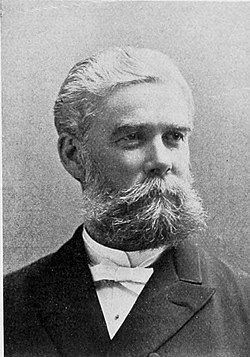effort was made to obtain its adoption in complete form. That remarkable code known as the Livingston system agrees with the Spencerian principles of ethics, and has been a source of inspiration for the most advanced penal legislation of recent years. Louisiana adopted it only in part, but Belgium has the Livingston code in its entirety. California, suffering under difficult local conditions, took a course in the liberal pioneer days that has for a time rendered progress  Warden W. E. Hale, of San Quentin. along the lines of modern development extremely difficult.
Warden W. E. Hale, of San Quentin. along the lines of modern development extremely difficult.
California is a large and populous State, many portions of which are thinly settled and hard to reach. In early days it had many Spanish and Mexican outlaws, and became a refuge for criminals from all parts of the world. When the State was organized, money was extremely abundant, and every one had golden dreams. The idea of self-supporting prisons seemed absurd, not only because the rich young State seemed capable of supporting any expense, but also because no manufactures were yet established, and the most active penologist would have found it hard to find suitable employment for prisoners.
As time went on, the very strong labor unions of California, aided by many newspapers and politicians, accepted the principle that every dollar a convict earned was taken from some citizen, and that the State was bound to support its criminals in idleness. Numbers of good and earnest men in the service of the State as prison commissioners, wardens, and other officials studying methods elsewhere and mindful of local conditions, have made untiring efforts to stir the public conscience, and to gain recognition of a criminal's right to earn his own living by productive labor. As long ago as 1872 Hon. E. T. Crane, of Alameda County, chairman of a joint Assembly and Senate committee, made an excellent and progressive report on prison reforms. Something has been gained since then, and, though working under adverse conditions, the prisons have been excellently managed. But these results are due to individuals, not to the system, nor to the well-meant but often injurious enactments of legislatures meeting biennially for only sixty days.

